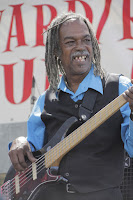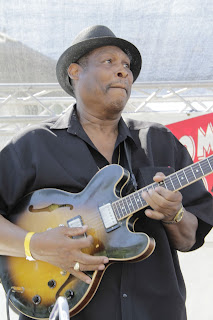 The blues, simply put, is twelve measures and three chords.
It is also the aural history of a burdened, persevering people and an ancestor of
American popular music as we have come to know it over the last century. The
blues is sadness and joy, and the complicated reality in between; it is a
celebration of victory and a repudiation of defeat. Blues is personal,
communal, and global in its reach and appeal.
The blues, simply put, is twelve measures and three chords.
It is also the aural history of a burdened, persevering people and an ancestor of
American popular music as we have come to know it over the last century. The
blues is sadness and joy, and the complicated reality in between; it is a
celebration of victory and a repudiation of defeat. Blues is personal,
communal, and global in its reach and appeal.
The blues also has a complicated history; it a river with
many tributaries.
 Enslaved peoples brought the complicated polyrhythms of West
Africa to America, but maintaining the tradition was difficult in the face of
prohibitions against drumming (on account of the slaves’ ability to communicate
under the master’s nose). New rhythmic ingredients, however, became available. French
settlers and their light-skinned creole offspring regularly congregated in New
Orleans’ Congo Square to play marches, quadrilles and minuets; slaves fortunate
enough to accompany their masters on trips to town were introduced to the strict
double- and triple-meters of European music, which eventually melded with the
rich African tradition. (The banjo, which became a staple of American
households for a time, was based an instrument originating in Africa.) Slave
musicians began to combine the inflected tonality of their own music (the
slightly flatted third and fifth scale degrees we refer to today as “blue”
notes) with the measured strides and harmonic structures of Congo Square.
Moreover, the exposure introduced slaves to new instruments, including the
cornet, trumpet, trombone, and clarinet. Even today, the New Orleans jazz march
retains the threads of those early beginnings.
Enslaved peoples brought the complicated polyrhythms of West
Africa to America, but maintaining the tradition was difficult in the face of
prohibitions against drumming (on account of the slaves’ ability to communicate
under the master’s nose). New rhythmic ingredients, however, became available. French
settlers and their light-skinned creole offspring regularly congregated in New
Orleans’ Congo Square to play marches, quadrilles and minuets; slaves fortunate
enough to accompany their masters on trips to town were introduced to the strict
double- and triple-meters of European music, which eventually melded with the
rich African tradition. (The banjo, which became a staple of American
households for a time, was based an instrument originating in Africa.) Slave
musicians began to combine the inflected tonality of their own music (the
slightly flatted third and fifth scale degrees we refer to today as “blue”
notes) with the measured strides and harmonic structures of Congo Square.
Moreover, the exposure introduced slaves to new instruments, including the
cornet, trumpet, trombone, and clarinet. Even today, the New Orleans jazz march
retains the threads of those early beginnings.Music of the Church also influenced the blues. Displaced and degraded, their native religions banned, slaves were starved for community. Somewhat cynically, slave owners accepted and even encouraged Church-going: if the slaves wanted the Gospel, letting them have it paid a dividend. After all, Paul himself urged servants to “be obedient to them that are your masters according to the flesh, with fear and trembling, in singleness of your heart, as unto Christ” (Eph 6:5). The hymns and spirituals that arose blended existing liturgical music with the energy and group performance practices of Africa. The slaves, perhaps to their masters’ discomfort, more than learning the lesson of obedience, identified with the children of Israel, seekers of a promised land. That strong connection outlasted slavery and cemented the role of the Church in the African-American community. As a result, many young blues musicians received inspiration from the soul-rocking music of a Baptist congregation.
The form of the blues in musical terms is AAB, where A and B
represent separate verses. The repeated A verse is usually a declaration of
sadness, trouble, or loss, but B is often a pithy commentary. This style traces
its origin to field hollers, call and response work songs where a leader calls
out a verse, and the group repeats, following with a chorus. Such songs not
only relieved the monotony of backbreaking labor but also held the community
together; group singing was an important reminder of the slaves’ humanity even
as their circumstances worked to strip them of it. Irony and humor, distress
and longing—expressing them in song was a balm for the soul. After Abolition, many
African American men and women found themselves back in the fields, this time
as sharecroppers; ostensibly free, but financially shackled to debt and
socially whipped by Jim Crow. Some mobility ensued, usually as men left their
southern homes to travel north looking for work. The Black Diaspora brought the
Delta Blues and New Orleans jazz north along the Mississippi to places like St
Louis, Kansas City, and Chicago.
 The blues also travelled east and west, landing in big
cities and small towns alike. One such was Russell City. On the western edge of
today’s Hayward, it never fulfilled its founders’ early expectations of a city
more opulent than San Francisco; nevertheless, by the 1950s, the town had become
home to about a thousand residents, despite a disturbing lack of
infrastructure, such as indoor running water, sewer systems, and pest control. In
its early days, the area drew farmers from Spain, Denmark, Germany, and Italy;
with the decline in farming, by mid-century African-Americans and Mexicans
formed the majority population. “One reason why so many people from these two
ethnic groups resided in Russell City,” says Dr. Maria Ochoa in her book
‘Russell City’ (2009, Arcadia Publ.), “is that nearby communities such as San
Leandro, Hayward, and San Lorenzo had covenants that prevented the sale of
homes to people who were not white.”
The blues also travelled east and west, landing in big
cities and small towns alike. One such was Russell City. On the western edge of
today’s Hayward, it never fulfilled its founders’ early expectations of a city
more opulent than San Francisco; nevertheless, by the 1950s, the town had become
home to about a thousand residents, despite a disturbing lack of
infrastructure, such as indoor running water, sewer systems, and pest control. In
its early days, the area drew farmers from Spain, Denmark, Germany, and Italy;
with the decline in farming, by mid-century African-Americans and Mexicans
formed the majority population. “One reason why so many people from these two
ethnic groups resided in Russell City,” says Dr. Maria Ochoa in her book
‘Russell City’ (2009, Arcadia Publ.), “is that nearby communities such as San
Leandro, Hayward, and San Lorenzo had covenants that prevented the sale of
homes to people who were not white.”
Small venues dotted the town. Clubs like the Russell City
Country Club, and Miss Alve’s are said to have hosted such stars as Ray
Charles, Big Mama Thornton, and T-Bone Walker. Guitarist and Blues Hall of
Famer Lowell Fulson, a Tulsa native and player of his own West Coast style of
blues, moved to Oakland in 1943 (he was drafted); after his release from the
Navy in 1945, he worked the shipyards by day, but played all around Russell
City by night. Celebrity players weren’t all that could be found, however.
Blues is a people’s music, welcoming to new players, and there was never a shortage
of local talent to justify the town’s reputation for hosting great blues music.
Russell City was evacuated in 1964 by eminent domain for the
development of an industrial park, but on July 8 and 9, the West Coast Blues
Society will rekindle the memories of the lost town and the blues it was known
for as it presents the 18th Annual Hayward/Russell City Blues Festival. If
you’re lucky, you might hear the ghosts of blues past playing right along.
Featured artists:
Little Ed and the Blues Imperials
Grady Champion
Kingfish
Little Jimmy Reed
Chick Rodgers
The Kimbrough Brothers
Willie Cobbs
Marcus Cartwright
Carla Robinson
Southern Soul Review (featuring Johnny Rawls, Blues Boy
Willie, Linwood Taylor)
The Soul Brothers
Lady Gigi
Lucky Lloyd
Oakland Sam
Guitar Mac
Blues Society Caravan of All-Stars
Leo and the Blues Knock Outs
Stars of Glory
Blues Harmonica Explosion
The Russell City Memorial Blues Band
and More
Hayward/Russell City Blues Fest
Saturday and Sunday, July 8 and 9, 2017
11 a.m. – 7 p.m.
Hayward City Hall Plaza
777 B Street, Hayward
(510) 472-8800 or (707) 647-3962
eventbrite.com or email: hipwayblues@hotmail.com
westcoastbluessociety.com
$30 in Advance
$35 at the Gate



No comments:
Post a Comment